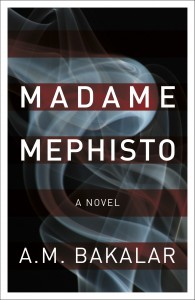 Published by Stork Press 19 April 2012
Published by Stork Press 19 April 2012
240pp, paperback, 8.99
Reviewed by Elsbeth Lindner
Mother Poland is comprehensively slammed in A.M. Bakalar’s punchy debut, a tale of Polish migration that supplements its core of rebellion and noncomformity with a layer of melodrama.
Its narrator, who has the habit of switching from first to third person, is Magda Rodziewicz, revealing her experiences and feelings to an unnamed relative, possibly her twin sister Alicja. The mystery figure is definitely not her traditionalist mother whose Roman Catholicism, immersion in home-making and insistence on marriage and motherhood as the only fit roles for girl children are some of the reasons Magda quit Poland for a new life in London.
However Magda’s distaste for her homeland extends far beyond her mother, to withering criticism of Polish religion, politics, traditions, backwardness, racism and hypocrisy. So is she a modern free spirit, a voice of the new generation of Polish migrants, or something more Machiavellian?
Her story is peppered with grandiose, Iago-esque statements of exclusion: ‘I do not believe in happy endings’; ‘Hatred, conflict, confusions have become the basis of my existence.’ And then there’s the drug-dealing. Although much of the novel is devoted to accounts of the various jobs Magda performs in London until sacked – accounts which offer some comic snapshots of the UK workplace from her truculent perspective – these are all apparent covers for her real work, ‘saving lives’, i.e. supplying home-grown cannabis to actors, city traders, corrupt policemen, even a Booker-shortlisted novelist.
Mouthpiece of new Poland or amoral ballbreaker? The dilemma over Magda reaches a conclusion in the body-swerving last quarter of the book, as the identity of the character receiving her confession emerges and a synthesis takes place. Prickly, love-me-or-hate-me Magda wil stick to her determined path while also accepting her family responsibilities.
Bakalar’s novel, packed with these choice juxtapositions, has moments of pure rant, including plenty to say about Polish immigrants to the UK: ‘Staying among Poles, speaking Polish all day long, makes you lazy. No wonder most Poles work as builders, fruit and vegetable pickers, cleaners, factory workers. You don’t need a certificate in advanced English to do these jobs.’
Controversial opinions and confrontational characterization aside, what’s most striking about the book is its vigour and the curious charisma of Magda herself. Balakar has created a contemporary anti-heroine with a heart of pure titanium, the bad girl who eventually comes if not exactly good, then good–ish.
